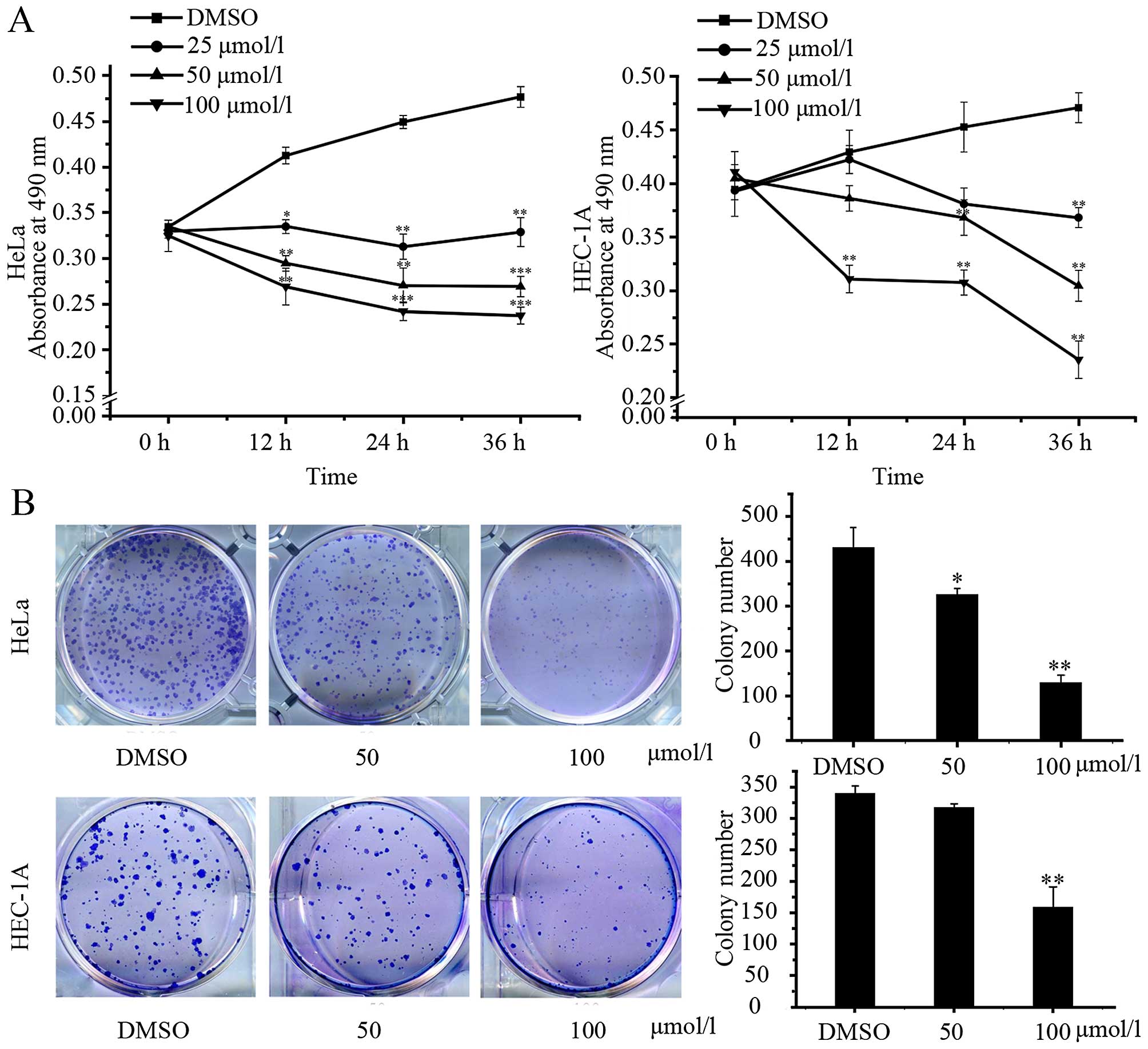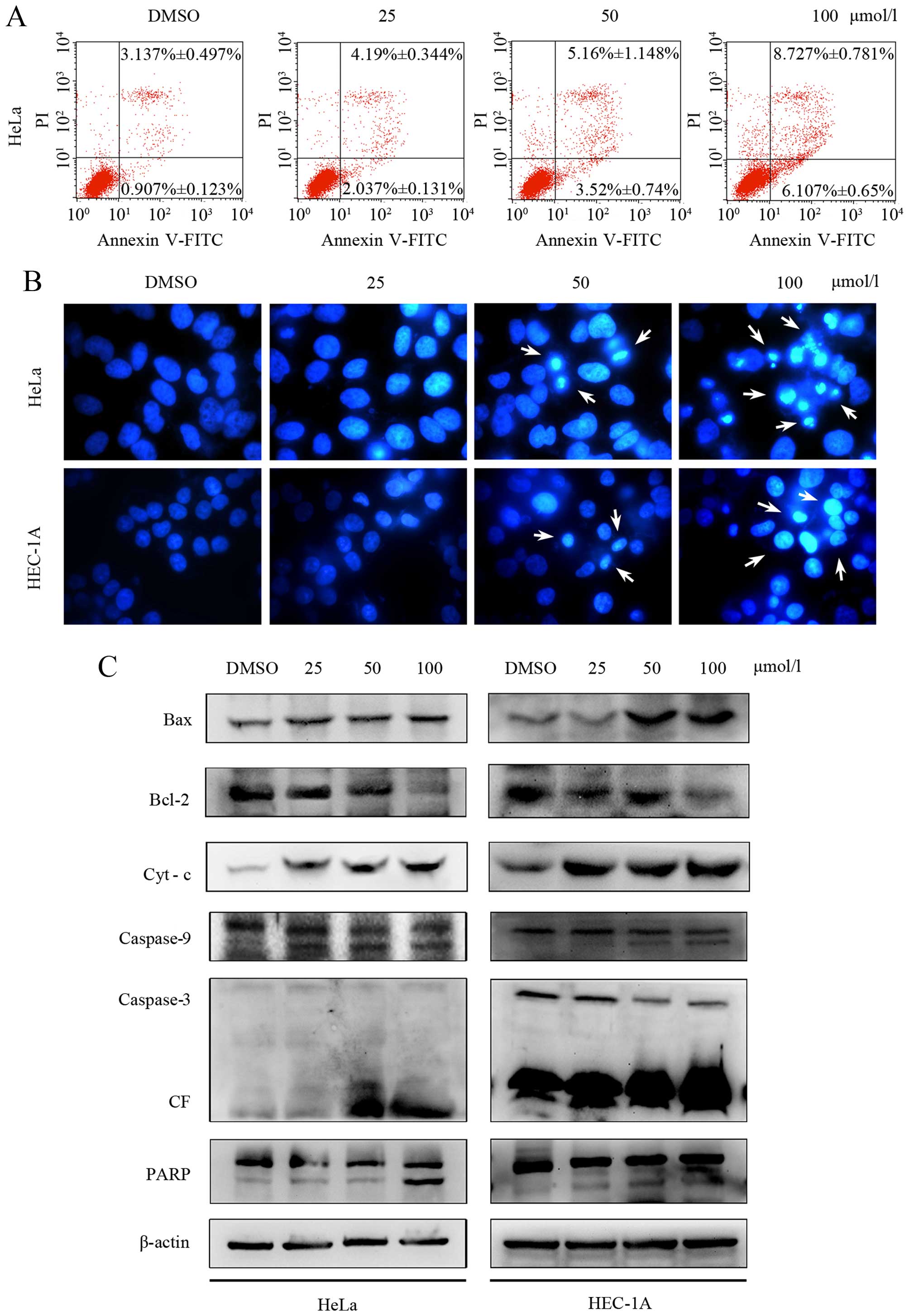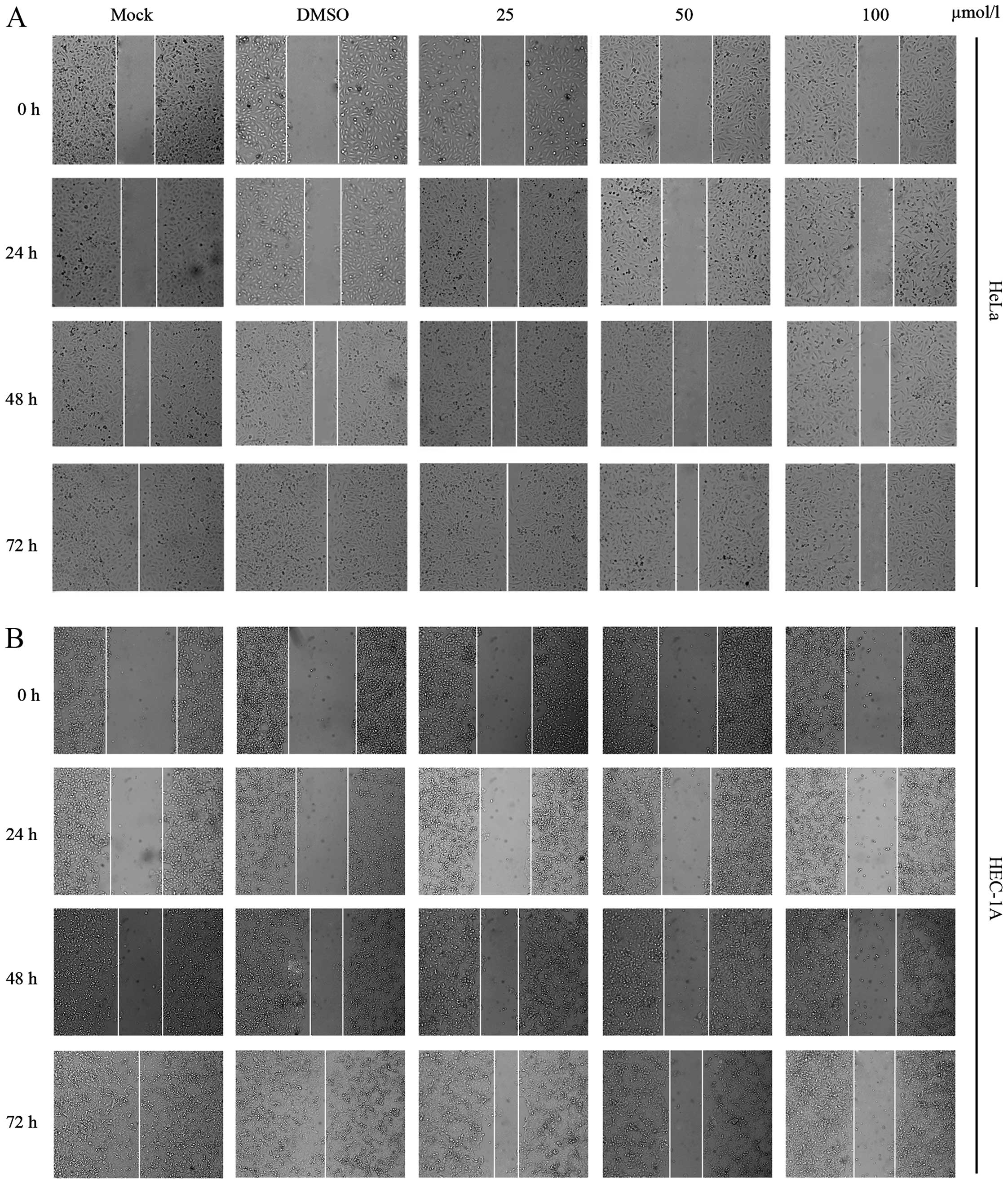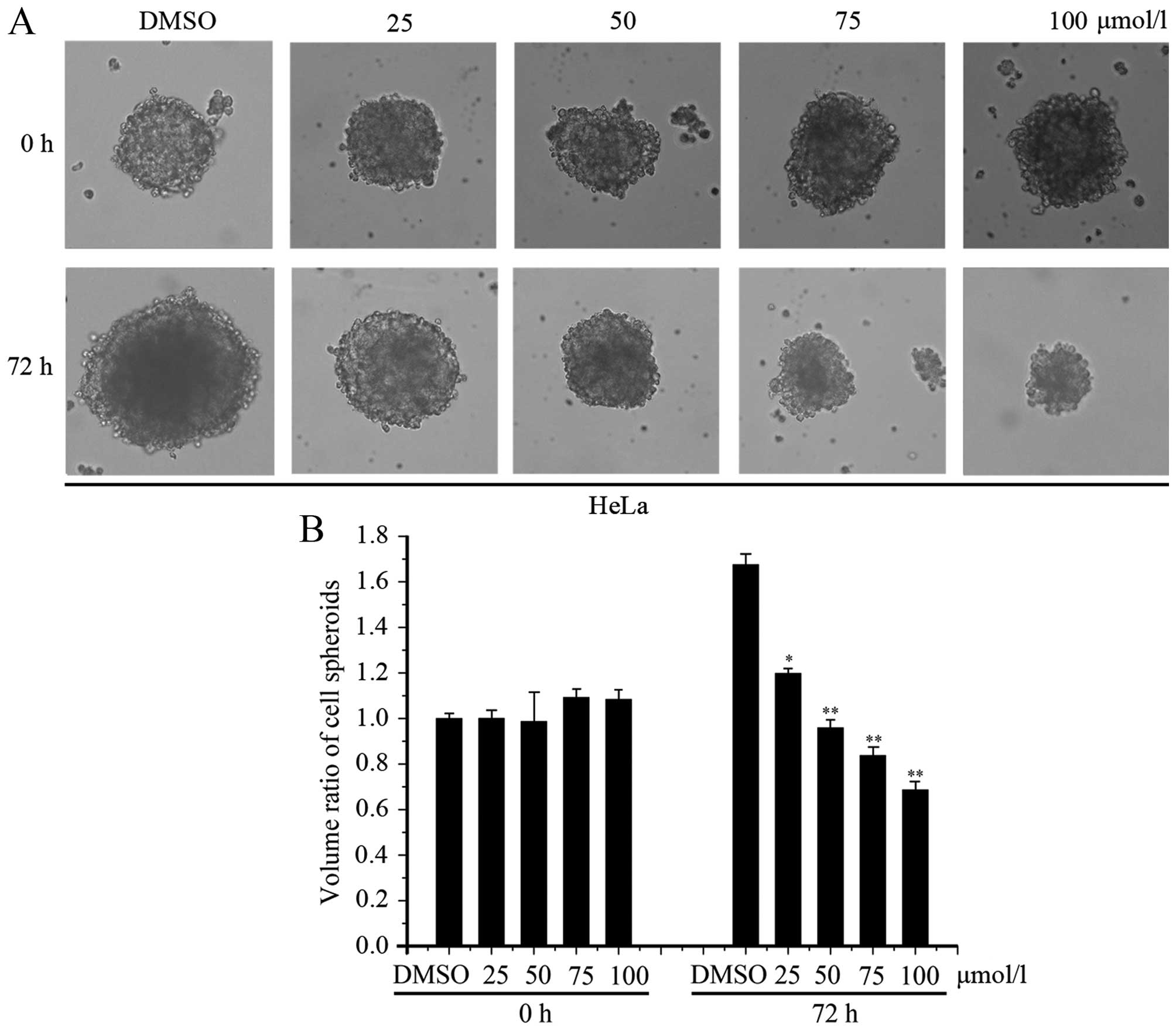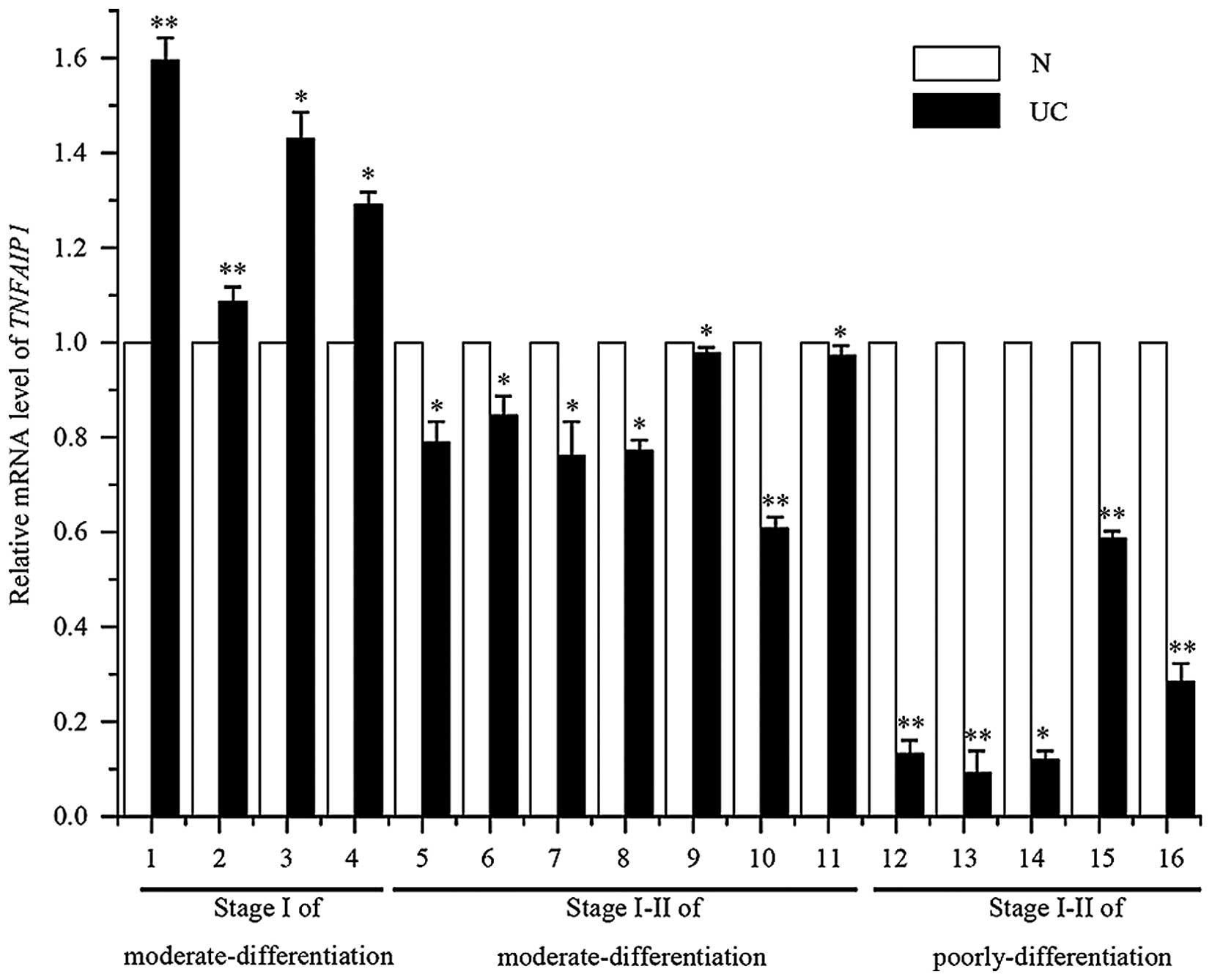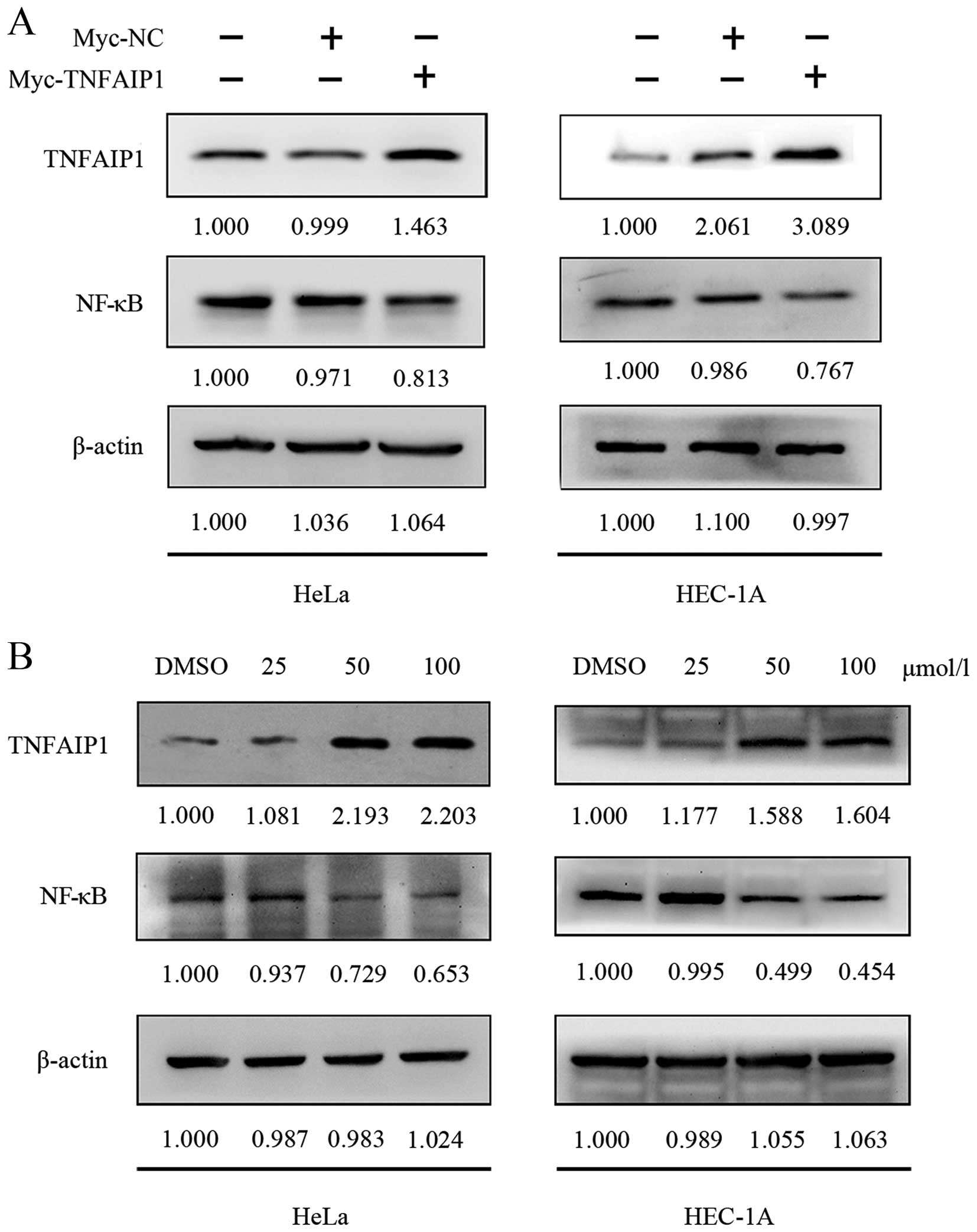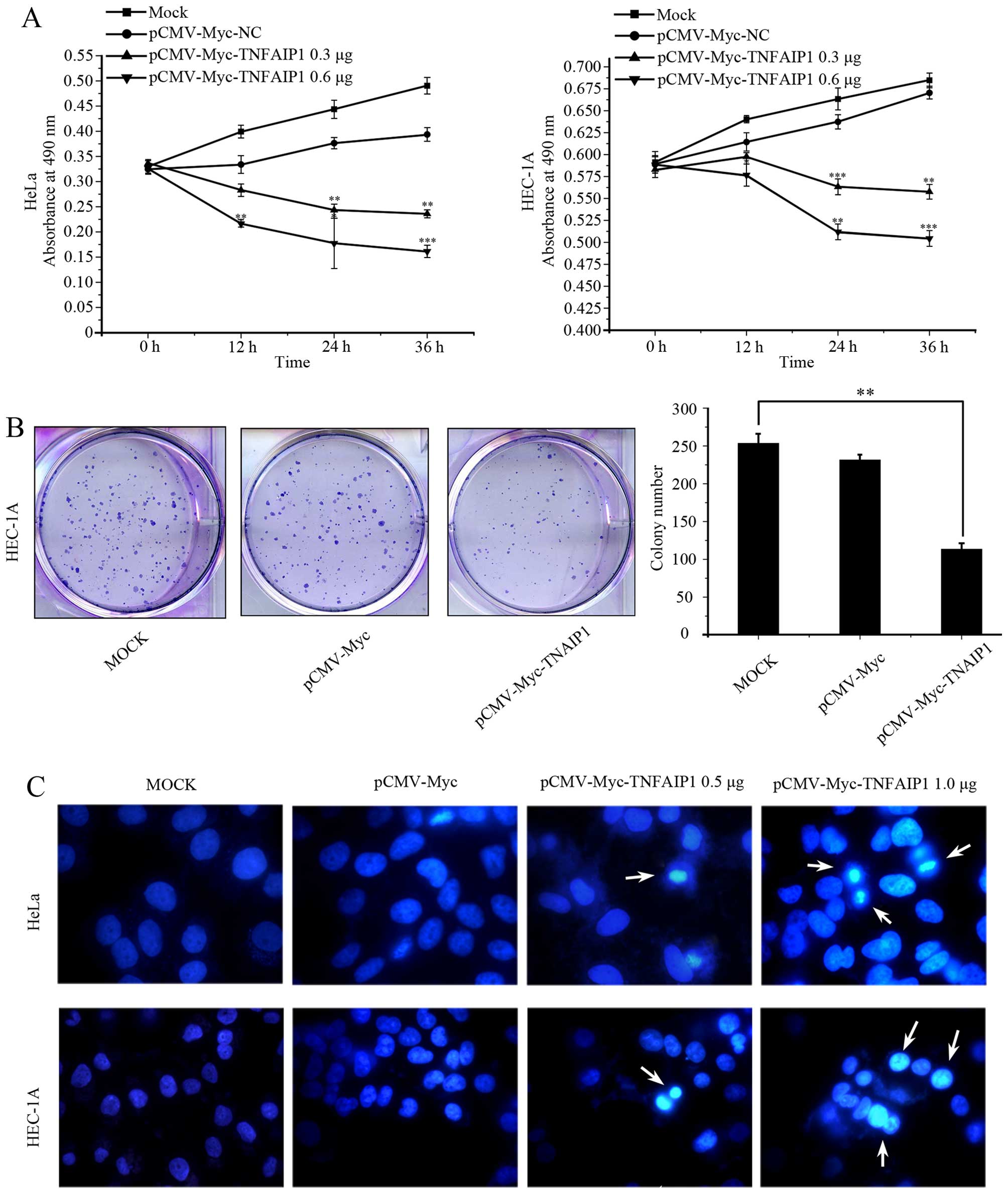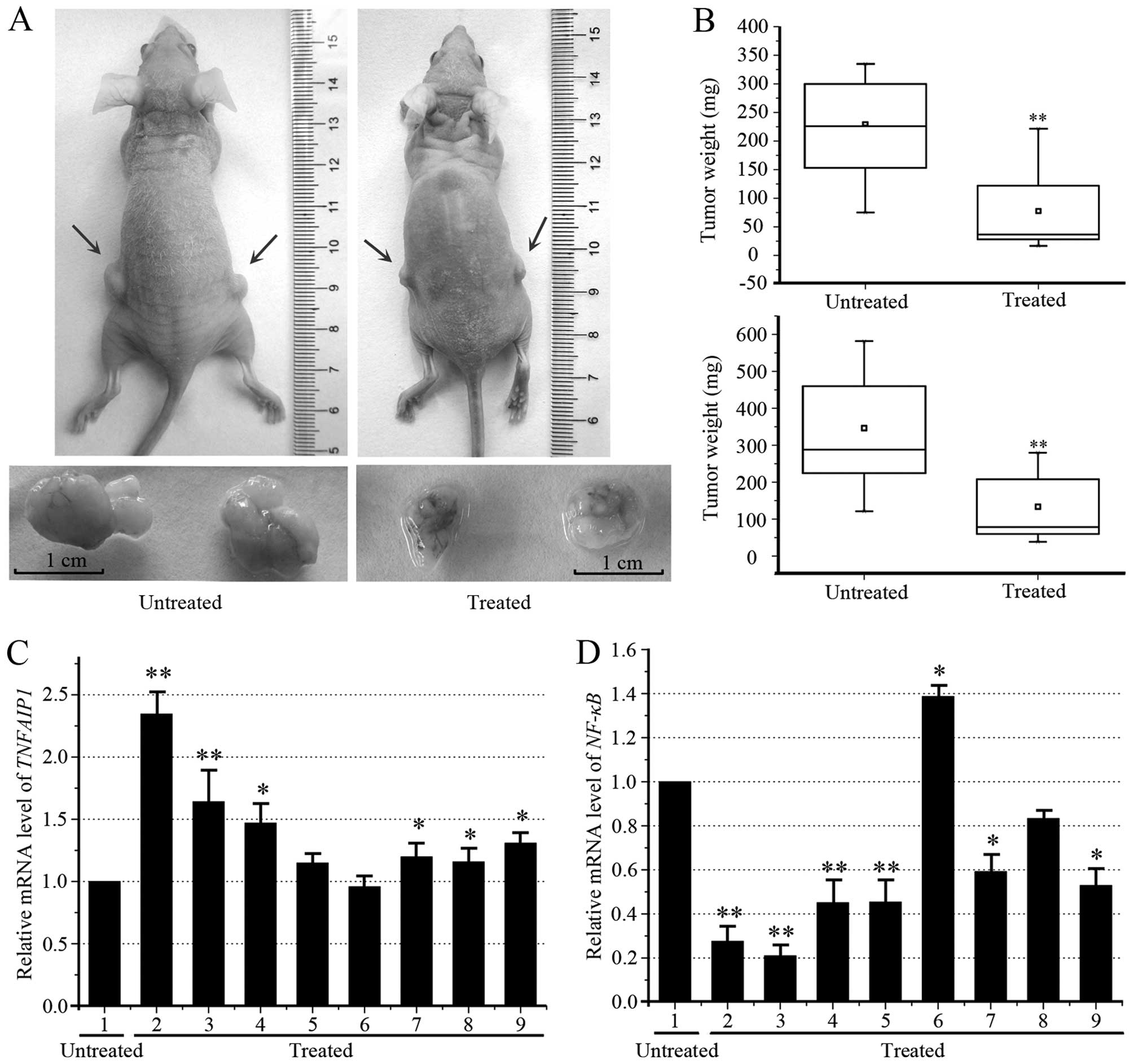|
1
|
Ferlay J, Shin HR, Bray F, Forman D,
Mathers C and Parkin DM: Estimates of worldwide burden of cancer in
2008: GLOBOCAN 2008. Int J Cancer. 127:2893–2917. 2010. View Article : Google Scholar
|
|
2
|
Barbera L and Thomas G: Management of
early and locally advanced cervical cancer. Semin Oncol.
36:155–169. 2009. View Article : Google Scholar : PubMed/NCBI
|
|
3
|
Yang Y, Li Y, Li J, Wang J and Yan Z:
Tendency and strategy of younger patients with cervical carcinoma.
Med Natl Defending Forces Southwest China. 1:53–55. 2008.
|
|
4
|
Huang CY, Chen CA, Chen YL, Chiang CJ, Hsu
TH, Lin MC, Lai MS, Chen CJ, You SL and Cheng WF: Nationwide
surveillance in uterine cancer: survival analysis and the
importance of birth cohort: 30-year population-based registry in
Taiwan. PLoS One. 7:e513722012. View Article : Google Scholar : PubMed/NCBI
|
|
5
|
Zhang Z, Li B, Meng X, Yao S, Jin L, Yang
J, Wang J, Zhang H, Zhang Z, Cai D, et al: Berberine prevents
progression from hepatic steatosis to steatohepatitis and fibrosis
by reducing endoplasmic reticulum stress. Sci Rep. Feb 9–2016.(Epub
ahead of print). View Article : Google Scholar
|
|
6
|
Yu D, An F, He X and Cao X: Curcumin
inhibits the proliferation and invasion of human osteosarcoma cell
line MG-63 by regulating miR-138. Int J Clin Exp Pathol.
8:14946–14952. 2015.
|
|
7
|
Tian L, Shen D, Li X, Shan X, Wang X, Yan
Q and Liu J: Ginsenoside Rg3 inhibits epithelial-mesenchymal
transition (EMT) and invasion of lung cancer by down-regulating
FUT4. Oncotarget. 7:1619–1632. 2016.
|
|
8
|
Vistad I, Fosså SD and Dahl AA: A critical
review of patient-rated quality of life studies of long-term
survivors of cervical cancer. Gynecol Oncol. 102:563–572. 2006.
View Article : Google Scholar : PubMed/NCBI
|
|
9
|
Ma XX, Wang D, Zhang YJ and Yang CR:
Identification of new qingyangshengenin and caudatin glycosides
from the roots of Cynanchum otophyllum. Steroids. 76:1003–1009.
2011. View Article : Google Scholar : PubMed/NCBI
|
|
10
|
Yin ZQ, Yu SL, Wei YJ, Ma L, Wu ZF, Wang
L, Zhang QW, Zhao M, Ye WC, Che CT, et al: C21 steroidal glycosides
from Cynanchum Stauntonii induce apoptosis in HepG2 cells.
Steroids. 106:55–61. 2016. View Article : Google Scholar
|
|
11
|
Wang YQ, Zhang SJ, Lu H, Yang B, Ye LF and
Zhang RS: A C21-steroidal glycoside isolated from the
roots of cynanchum auriculatum induces cell cycle arrest and
apoptosis in human gastric cancer SGC-7901 cells. Evid Based
Complement Alternat Med. 2013:1808392013.
|
|
12
|
Fu XY, Zhang S, Wang K, Yang MF, Fan CD
and Sun BL: Caudatin inhibits human glioma cells growth through
triggering DNA damage-mediated cell cycle arrest. Cell Mol
Neurobiol. 35:953–959. 2015. View Article : Google Scholar : PubMed/NCBI
|
|
13
|
Fei HR, Cui LY, Zhang ZR, Zhao Y and Wang
FZ: Caudatin inhibits carcinomic human alveolar basal epithelial
cell growth and angiogenesis through modulating GSK3β/β-catenin
pathway. J Cell Biochem. 113:3403–3410. 2012. View Article : Google Scholar : PubMed/NCBI
|
|
14
|
Li X, Zhang X, Liu X, Tan Z, Yang C, Ding
X, Hu X, Zhou J, Xiang S, Zhou C, et al: Caudatin induces cell
apoptosis in gastric cancer cells through modulation of
Wnt/β-catenin signaling. Oncol Rep. 30:677–684. 2013.PubMed/NCBI
|
|
15
|
Peng Y and Ding Y: Pharmacokinetics and
tissue distribution study of caudatin in normal and
diethylnitrosamine-induced hepatocellular carcinoma model rats.
Molecules. 20:4225–4237. 2015. View Article : Google Scholar : PubMed/NCBI
|
|
16
|
Luo Y, Sun Z, Li Y, Cai X and Li Z:
Caudatin inhibits human hepatoma cell growth and metastasis through
modulation of the Wnt/β-catenin pathway. Oncol Rep. 30:2923–2928.
2013.PubMed/NCBI
|
|
17
|
Wang LJ, Geng CA, Ma YB, Luo J, Huang XY,
Chen H, Zhou NJ, Zhang XM and Chen JJ: Design, synthesis, and
molecular hybrids of caudatin and cinnamic acids as novel
anti-hepatitis B virus agents. Eur J Med Chem. 54:352–365. 2012.
View Article : Google Scholar : PubMed/NCBI
|
|
18
|
Peng YR, Ding YF, Wei YJ, Shu B, Li YB and
Liu XD: Caudatin-2,6-dideoxy-3-O-methy-β-D-cymaropyranoside 1
induced apoptosis through caspase 3-dependent pathway in human
hepatoma cell line SMMC7721. Phytother Res. 25:631–637. 2011.
View Article : Google Scholar
|
|
19
|
Wolf FW, Marks RM, Sarma V, Byers MG, Katz
RW, Shows TB and Dixit VM: Characterization of a novel tumor
necrosis factor-alpha-induced endothelial primary response gene. J
Biol Chem. 267:1317–1326. 1992.PubMed/NCBI
|
|
20
|
Link CD, Taft A, Kapulkin V, Duke K, Kim
S, Fei Q, Wood DE and Sahagan BG: Gene expression analysis in a
transgenic Caenorhabditis elegans Alzheimer’s disease model.
Neurobiol Aging. 24:397–413. 2003. View Article : Google Scholar : PubMed/NCBI
|
|
21
|
Yang L, Liu N, Hu X, Zhang W, Wang T, Li
H, Zhang B, Xiang S, Zhou J and Zhang J: CK2 phosphorylates TNFAIP1
to affect its subcellular localization and interaction with PCNA.
Mol Biol Rep. 37:2967–2973. 2010. View Article : Google Scholar
|
|
22
|
Zhou C, Li X, Zhang X, Liu X, Tan Z, Yang
C and Zhang J: microRNA-372 maintains oncogene characteristics by
targeting TNFAIP1 and affects NFκB signaling in human gastric
carcinoma cells. Int J Oncol. 42:635–642. 2013.
|
|
23
|
Zhang X, Li X, Tan Z, Liu X, Yang C, Ding
X, Hu X, Zhou J, Xiang S, Zhou C, et al: MicroRNA-373 is
upregulated and targets TNFAIP1 in human gastric cancer,
contributing to tumorigenesis. Oncol Lett. 6:1427–1434.
2013.PubMed/NCBI
|
|
24
|
Zhu Y, Yao Z, Wu Z, Mei Y and Wu M: Role
of tumor necrosis factor alpha-induced protein 1 in paclitaxel
resistance. Oncogene. 33:3246–3255. 2014. View Article : Google Scholar
|
|
25
|
Tian X, Zhang J, Yan L, Dong JM and Guo Q:
miRNA-15a inhibits proliferation, migration and invasion by
targeting TNFAIP1 in human osteosarcoma cells. Int J Clin Exp
Pathol. 8:6442–6449. 2015.PubMed/NCBI
|
|
26
|
Zhang CL, Wang C, Yan WJ, Gao R, Li YH and
Zhou XH: Knockdown of TNFAIP1 inhibits growth and induces apoptosis
in osteosarcoma cells through inhibition of the nuclear factor-κB
pathway. Oncol Rep. 32:1149–1155. 2014.PubMed/NCBI
|
|
27
|
Yang LP, Zhou AD, Li H, Zhang WF, Wu YY,
Zhang J and Han M: Expression profile in the cell lines of human
TNFAIP1 gene. Yi Chuan. 28:918–922. 2006.(In Chinese). PubMed/NCBI
|
|
28
|
Kim DM1, Chung KS, Choi SJ, Jung YJ, Park
SK, Han GH, Ha JS, Song KB, Choi NS, Kim HM, et al: RhoB induces
apoptosis via direct interaction with TNFAIP1 in HeLa cells. Int J
Cancer. 125:2520–2527. 2009. View Article : Google Scholar : PubMed/NCBI
|
|
29
|
Hu X, Yan F, Wang F, Yang Z, Xiao L, Li L,
Xiang S, Zhou J, Ding X and Zhang J: TNFAIP1 interacts with KCTD10
to promote the degradation of KCTD10 proteins and inhibit the
transcriptional activities of NF-κB and AP-1. Mol Biol Rep.
39:9911–9919. 2012. View Article : Google Scholar : PubMed/NCBI
|
|
30
|
Lin RZ and Chang HY: Recent advances in
three-dimensional multicellular spheroid culture for biomedical
research. Biotechnol J. 3:1172–1184. 2008. View Article : Google Scholar : PubMed/NCBI
|
|
31
|
Patra B, Peng CC, Liao WH, Lee CH and Tung
YC: Drug testing and flow cytometry analysis on a large number of
uniform sized tumor spheroids using a microfluidic device. Sci Rep.
Feb 15–2016.(Epub ahead of print). View Article : Google Scholar
|
|
32
|
Daniyal M, Akhtar N, Ahmad S, Fatima U,
Akram M and Asif HM: Update knowledge on cervical cancer incidence
and prevalence in Asia. Asian Pac J Cancer Prev. 16:3617–3620.
2015. View Article : Google Scholar : PubMed/NCBI
|
|
33
|
Singh R: Review literature on uterine
carcinosarcoma. J Cancer Res Ther. 10:461–468. 2014.PubMed/NCBI
|
|
34
|
Jemal A, Siegel R, Ward E, Hao Y, Xu J,
Murray T and Thun MJ: Cancer statistics, 2008. CA Cancer J Clin.
58:71–96. 2008. View Article : Google Scholar : PubMed/NCBI
|
|
35
|
May BH, Lu C, Bennett L, Hügel HM and Xue
CC: Evaluating the traditional Chinese literature for herbal
formulae and individual herbs used for age-related dementia and
memory impairment. Biogerontology. 13:299–312. 2012. View Article : Google Scholar : PubMed/NCBI
|
|
36
|
Goldar S, Khaniani MS, Derakhshan SM and
Baradaran B: Molecular mechanisms of apoptosis and roles in cancer
development and treatment. Asian Pac J Cancer Prev. 16:2129–2144.
2015. View Article : Google Scholar : PubMed/NCBI
|
|
37
|
Chen CT, Chen YC, Yamaguchi H and Hung MC:
Carglumic acid promotes apoptosis and suppresses cancer cell
proliferation in vitro and in vivo. Am J Cancer Res. 5:3560–3569.
2015.
|
|
38
|
Heath-Engel HM, Chang NC and Shore GC: The
endoplasmic reticulum in apoptosis and autophagy: Role of the BCL-2
protein family. Oncogene. 27:6419–6433. 2008. View Article : Google Scholar : PubMed/NCBI
|
|
39
|
Yun SI, Yoon HY and Chung YS: Glycogen
synthase kinase-3beta regulates etoposide-induced apoptosis via
Bcl-2 mediated caspase-3 activation in C3H10T1/2 cells. Apoptosis.
14:771–777. 2009. View Article : Google Scholar : PubMed/NCBI
|
|
40
|
Kelm JM, Timmins NE, Brown CJ, Fussenegger
M and Nielsen LK: Method for generation of homogeneous
multicellular tumor spheroids applicable to a wide variety of cell
types. Biotechnol Bioeng. 83:173–180. 2003. View Article : Google Scholar : PubMed/NCBI
|
|
41
|
Weiswald LB, Bellet D and Dangles-Marie V:
Spherical cancer models in tumor biology. Neoplasia. 17:1–15. 2015.
View Article : Google Scholar : PubMed/NCBI
|
|
42
|
Winters BS, Shepard SR and Foty RA:
Biophysical measurement of brain tumor cohesion. Int J Cancer.
114:371–379. 2005. View Article : Google Scholar
|
|
43
|
López J, Poitevin A, Mendoza-Martínez V,
Pérez-Plasencia C and García-Carrancá A: Cancer-initiating cells
derived from established cervical cell lines exhibit stem-cell
markers and increased radioresistance. BMC Cancer. Jan
28–2012.(Epub ahead of print). View Article : Google Scholar
|
|
44
|
Grinchuk OV, Motakis E and Kuznetsov VA:
Complex sense-antisense architecture of TNFAIP1/POLDIP2 on 17q11.2
represents a novel transcriptional structural-functional gene
module involved in breast cancer progression. BMC Genomics.
11(Suppl 1): S92010. View Article : Google Scholar : PubMed/NCBI
|
|
45
|
Skoblov M, Marakhonov A, Marakasova E,
Guskova A, Chandhoke V, Birerdinc A and Baranova A: Protein
partners of KCTD proteins provide insights about their functional
roles in cell differentiation and vertebrate development.
Bioessays. 35:586–596. 2013. View Article : Google Scholar : PubMed/NCBI
|















